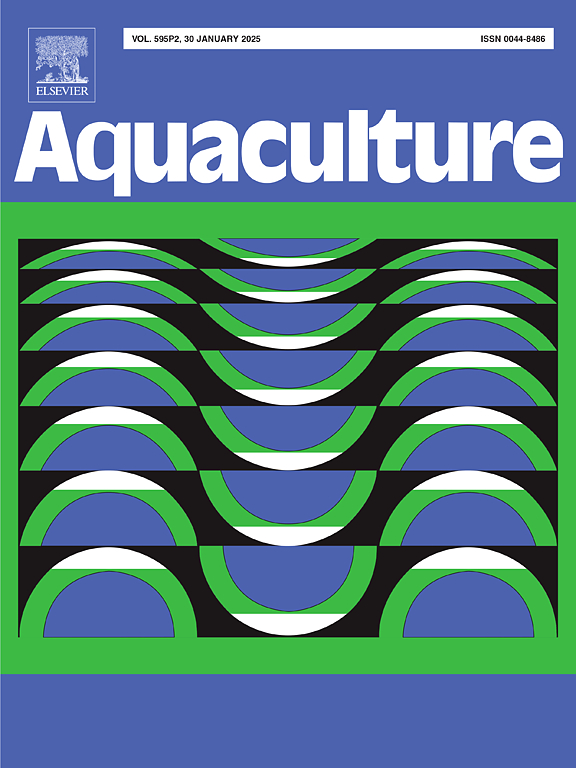万年青对急性肝胰腺坏死病抗性的基因组选择
IF 3.9
1区 农林科学
Q1 FISHERIES
引用次数: 0
摘要
急性肝胰腺坏死病(AHPND)是由副溶血性弧菌(VPAHPND)引起的一种主要细菌性疾病,给太平洋南美白对虾(Litopenaeus vannamei)养殖业造成重大经济损失。培育抗病种群被认为是解决疾病问题的基本策略。本研究评估了基因组选择(GS)提高凡纳滨对虾抗AHPND能力的可行性。在 VPAHPND 挑战之后,存活时间被用作评估 AHPND 抗性的表型指标。参考群体由 447 个基因分型个体和 288 个无基因分型个体组成。候选群体由 206 个未感染和基因分型的个体组成。含有 40 K 单核苷酸多态性(SNP)的液体芯片 "黄海芯片 1 号 "为参考群体和候选群体产生了基因型。利用关系矩阵(A 或 H)和动物模型的平均信息 REML 法获得的存活时间遗传率分别为 0.16 ± 0.06 和 0.22 ± 0.07。使用随机、全同胞和族间交叉验证评估了基于血统的最佳线性无偏预测(PBLUP)、单步基因组 BLUP(ssGBLUP)和单步贝叶斯回归(ssBR)的预测准确性。与 PBLUP 相比,ssGBLUP 和 ssBR 对存活时间的预测准确率在随机交叉验证中分别提高了 15.00 % 和 67.50 %,在全同胞交叉验证中分别提高了 13.33 % 和 53.33 %。当从随机交叉验证或全同胞交叉验证转移到族间交叉验证时,所有方法的预测准确率都有所下降。使用全同胞交叉验证评估了基因组 BLUP(GBLUP)和贝叶斯 A(BayesA)的预测准确性。与 GBLUP 相比,BayesA 的预测准确率提高了 33.33%。ssBR 用于预测候选种的基因组估计育种值(GEBVs)。选出了 80 个高 GEBV 值候选者、86 个中等 GEBV 值候选者和 40 个低 GEBV 值候选者,以培育出具有不同抗性水平的后代。在 VPAHPND 挑战测试中,高抗性后代的平均存活时间比中等抗性后代长 10.15%,比低抗性后代长 102.01%。这项研究验证了 GS 在提高凡纳滨鲤对 AHPND 的抗性方面的实用性和成功性。本文章由计算机程序翻译,如有差异,请以英文原文为准。
Genomic selection of resistance to acute hepatopancreatic necrosis disease in Litopenaeus vannamei
Acute hepatopancreatic necrosis disease (AHPND) is a major bacterial disease caused by Vibrio parahaemolyticus (VPAHPND) that results in significant economic losses to Pacific white shrimp Litopenaeus vannamei aquaculture. Breeding of disease-resistant broodstocks is regarded as a fundamental strategy for solving the disease problem. This study evaluated the feasibility of genomic selection (GS) for enhancing the AHPND resistance of L.vannamei. Following the VPAHPND challenge, the survival time was utilized as a phenotypic measure to assess the AHPND resistance. The reference population consisted of 447 genotyped and 288 no-genotyped individuals with phenotypes. The candidate population consisted of 206 uninfected and genotyped individuals. The liquid chip “Yellow Sea Chip No.1” with 40 K single nucleotide polymorphism (SNP) generated genotypes for the reference and candidate populations. Heritabilities of survival time obtained using the average information REML method with a relationship matrix (A or H) and an animal model were 0.16 ± 0.06 and 0.22 ± 0.07, respectively. Predictive accuracies of pedigree-based best linear unbiased prediction (PBLUP), single-step genomic BLUP (ssGBLUP), and single-step Bayesian regression (ssBR) were evaluated using random, full-sib and between-family cross-validation. Compared to PBLUP, the predictive accuracies of ssGBLUP and ssBR for the survival time increased by 15.00 % and 67.50 % in random cross-validation, and 13.33 % and 53.33 % in full-sib cross-validation, respectively. All methods exhibited a reduction in predictive accuracy when moving from the random cross-validation or full-sib cross-validation to the between-family cross-validation. The predictive accuracies of Genomic BLUP (GBLUP) and Bayesian A (BayesA) were evaluated using full-sib cross-validation. Compared to GBLUP, the predictive accuracy of BayesA increased by 33.33 %. ssBR was used to predict the candidates' genomic estimated breeding values (GEBVs). 80 candidates with high GEBVs, 86 with medium GEBVs, and 40 with low GEBVs were selected to breed offspring with a spectrum of resistance levels. In the VPAHPND challenge test, the high resistance offspring had mean survival times that were 10.15 % longer than the moderate resistance offspring and 102.01 % longer than the low resistance offspring. This study validates the practicality and success of GS in improving resistance to AHPND in L.vannamei.
求助全文
通过发布文献求助,成功后即可免费获取论文全文。
去求助
来源期刊

Aquaculture
农林科学-海洋与淡水生物学
CiteScore
8.60
自引率
17.80%
发文量
1246
审稿时长
56 days
期刊介绍:
Aquaculture is an international journal for the exploration, improvement and management of all freshwater and marine food resources. It publishes novel and innovative research of world-wide interest on farming of aquatic organisms, which includes finfish, mollusks, crustaceans and aquatic plants for human consumption. Research on ornamentals is not a focus of the Journal. Aquaculture only publishes papers with a clear relevance to improving aquaculture practices or a potential application.
 求助内容:
求助内容: 应助结果提醒方式:
应助结果提醒方式:


